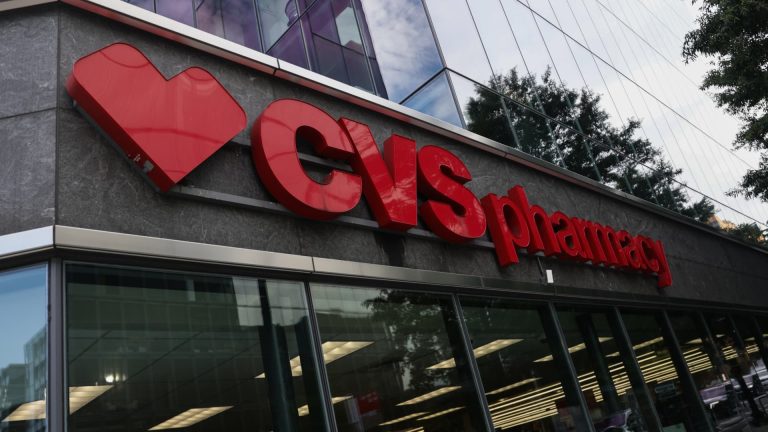CVS Pharmacy logo is seen in Washington DC, United States on July 9, 2024.
Jakub Porzycki | Nurphoto | Getty Images
CVS Health on Thursday reported first-quarter earnings and revenue that topped estimates and hiked its guidance, as its troubled insurance business showed some improvement during the period.
The company now expects full-year adjusted earnings of $6 to $6.20 per share, up from a previous guidance of $5.75 to $6 per share.
But the company revised its GAAP diluted EPS guidance to be lower, which includes charges related to a legal battle involving its pharmacy services provider subsidiary, Omnicare. A jury this week found Omnicare liable for dispensing drugs without valid prescriptions to elderly and disabled individuals in assisted living and long-term care facilities. CVS plans to appeal.
The company did not provide a revenue forecast for the year. CVS said it is “maintaining a cautious view for the remainder of the year” in light of continued higher medical costs and “the potential for macro headwinds.”
Here’s what CVS reported for the first quarter compared with what Wall Street was expecting, based on a survey of analysts by LSEG:
Earnings per share: $2.25 per share adjusted vs. $1.70 per share expectedRevenue: $94.59 billion vs. $93.64 billion expected
The company’s insurer, Aetna, and its rivals have been dogged by higher-than-expected medical costs over the last year as more Medicare Advantage patients return to hospitals for procedures they delayed during the pandemic. But for the first time in several quarters, CVS’ insurance business appeared to show some signs of improvement.
The unit’s medical benefit ratio — a measure of total medical expenses paid relative to premiums collected — decreased to 87.3% from 90.4% a year earlier. A lower ratio typically indicates that a company collected more in premiums than it paid out in benefits, resulting in higher profitability.
CVS said the move partly reflects stronger underlying performance in its Medicare business and improved Medicare Advantage star ratings for the 2025 payment year. Those ratings help patients compare the quality of Medicare health and drug plans.
Still, that was partially offset by a charge of $431 million from so-called premium deficiency reserves in the insurance unit, which is related to anticipated losses in the 2025 coverage year. That refers to a liability that an insurer may need to cover if future premiums are not enough to pay for anticipated claims and expenses.
The company posted net income of $1.78 billion, or $1.41 per share, for the first quarter. That compares with net income of $1.12 billion, or 88 cents per share, for the year-earlier period.
Excluding certain items, such as amortization of intangible assets, restructuring charges and capital losses, adjusted earnings were $2.25 per share for the quarter.
CVS booked sales of $94.59 billion for the first quarter, up 7% from the same period a year ago due to growth across all three of its business segments.
But sales in the company’s retail pharmacy segment missed Wall Street’s expectations for the quarter, according to StreetAccount. That business has been pressured by softer consumer spending and lower reimbursements for prescription drugs.
The results caps off the second full quarter with David Joyner, a longtime CVS executive, as CEO of the retail drugstore chain. Joyner succeeded Karen Lynch in mid-October, as CVS struggled to drive higher profits and improve its stock performance.
The company underwent a management reshuffle as part of a broader turnaround plan that includes $2 billion in cost cuts over the next several years.
Strength across business units
CVS’ insurance business booked $34.81 billion in revenue during the quarter, up 8% from the first quarter of 2024. Analysts expected the unit to take in $33.51 billion for the period, according to estimates from StreetAccount.
The unit also recorded adjusted operating income of $1.99 billion for the first quarter, compared with $732 million for the year-earlier period.
Also on Thursday, CVS said Aetna will stop offering health insurance plans on the Affordable Care Act marketplaces — also known as individual exchanges — starting in the 2026 plan year.
CVS’ pharmacy and consumer wellness division booked $31.91 billion in sales for the first quarter, up more than 11% from the same period a year earlier.
But that came far under the $35.27 billion that analysts were expecting for the quarter, according to StreetAccount.
That unit dispenses prescriptions in CVS’ more than 9,000 retail pharmacies and provides other pharmacy services, such as vaccinations and diagnostic testing.
CVS’ health services segment generated $43.46 billion in revenue for the quarter, up nearly 8% compared with the same quarter in 2024. Analysts expected the unit to post $43.64 billion in sales for the period, according to StreetAccount.
That unit includes Caremark, one of the nation’s largest pharmacy benefit managers. Caremark negotiates drug discounts with manufacturers on behalf of insurance plans and creates lists of medications, or formularies, that are covered by insurance and reimburses pharmacies for prescriptions.

